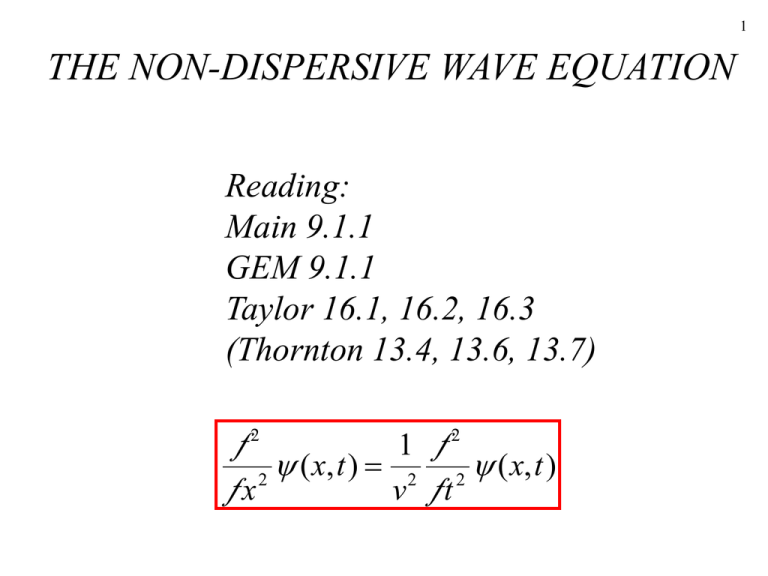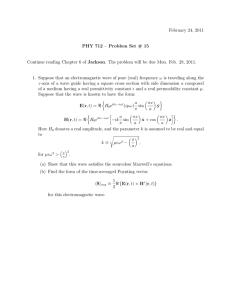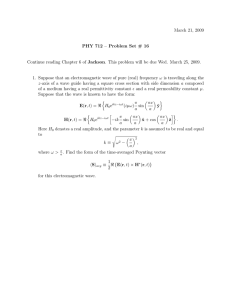THE NON-DISPERSIVE WAVE EQUATION Reading: Main 9.1.1 GEM 9.1.1
advertisement

1 THE NON-DISPERSIVE WAVE EQUATION Reading: Main 9.1.1 GEM 9.1.1 Taylor 16.1, 16.2, 16.3 (Thornton 13.4, 13.6, 13.7) ¶2 1 ¶2 y (x,t) = 2 2 y (x,t) 2 ¶x v ¶t Example: Non dispersive wave equation (a second order linear partial differential equation ¶ 1 ¶ y (x,t) = 2 2 y (x,t) 2 ¶x v ¶t 2 2 Demonstrate that both standing and traveling waves satisfy this equation (HW) PROVIDED w/k = v . Thus we recognize that v represents the wave velocity. (What does “velocity” mean for a standing wave?) 2 3 SEPARATION OF VARIABLES: Assume solution y(x,t) = X(x)T(t) Plug in and find 1 d X(x) 1 1 d T (t) = 2 2 X(x) dx v T (t) dt 2 2 2 Argue both sides must equal constant and set to a constant. For the moment, we'll say the constant must be negative, and we'll call it -k2 and this will be the same k as in the wave vector (you’ll see!). 4 Separation of variables: nd order which is a linear, 2 d X(x) 2 = -k X(x) ODE with solution 2 dx X(x) = B' p cos kx + B'q sin kx 2 Then d T (t) 2 2 2 = -v k T (t) = -w T (t) 2 dt T (t) = Bp cos w t + Bq sin w t 2 And Thus …. y(x,t) = X(x)T(t) linear, 2nd order ODE with solution Example: Non dispersive wave equation (a second order linear partial differential equation) ¶2 1 ¶2 y (x,t) = 2 2 y (x,t) 2 ¶x v ¶t y(x,t) = X(x)T(t) y (x,t) = Acos kx coswt + Bcos kx sin wt + C sin kx coswt + Dsin kx sin wt Separation of variables: Then With v = w/k, A, B, C, D arbitrary constants 5 6 Activity: Non dispersive wave equation Specifying initial conditions determines the (so far arbitrary) coefficients: ¶y (x,t) y (x,0); ¶t t = 0 In-class worksheet has different examples of initial conditions 7 A 1 2 3 4 B C D 8 THE NON-DISPERSIVE WAVE EQUATION -REVIEW • • • • (non-dispersive) wave equation separation of variables makes PDE -> ODE initial conditions determine arbitrary constants, mathematical representations of the above

